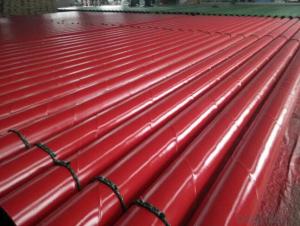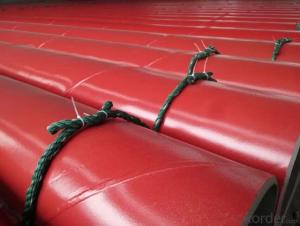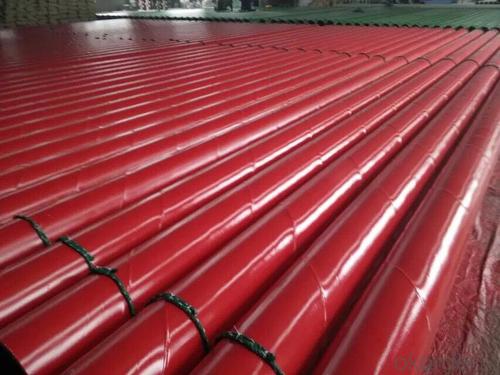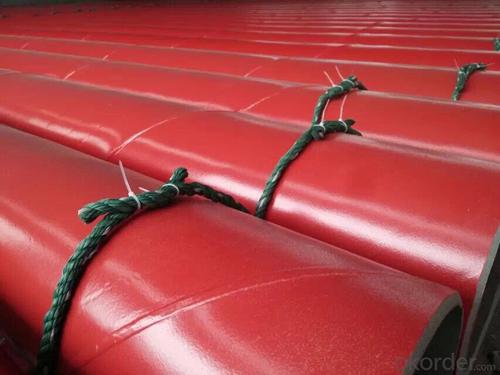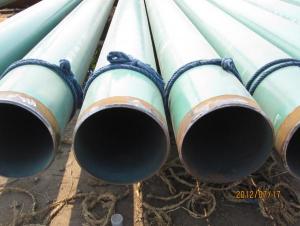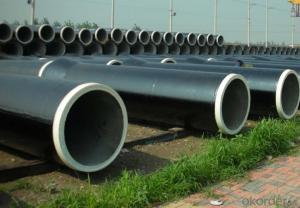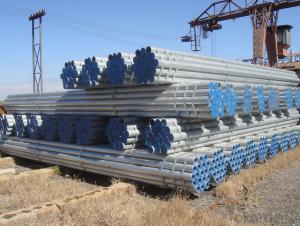seamless 3PE steel pipe external coating
- Loading Port:
- China Main Port
- Payment Terms:
- TT OR LC
- Min Order Qty:
- -
- Supply Capability:
- -
OKorder Service Pledge
OKorder Financial Service
You Might Also Like
Specifications
water pipeline inner-layer tape
1 Butyl rubber as adhesive
2. SGS test report and DVGW certificate
3. corrosion protection
water pipeline inner-layer tape
State-of-the-Art Pipeline Protection for All Climates & Environments
System description:
WATER PIPELINE Inner -layer tape also be called pipe wrap anti-corrosion tape, polyethylene wrap tape.
water pipeline Inner-layer tapeT100 is engineered to assure a high bond to the primed pipe surface with excellent conformability characteristics, aggressive adhesive for corrosion protection and repair of main line coatings.
Inner-layer tapeT100 series is cold applied tape coating system for corrosion protection of Oil, Gas, Petrochemical, and Waste Waterburied pipeline, pipe can be buried, also can be underground ,overhead ,onshore and offshore .
Structure of water pipeline inner wrap tape
The specification of the tape consists of two layers, adhesive layer and film backing
Adhesive: butyl rubber
Film backing: Special blend of stabilized polyethylene
Features & Benefits
Provides a permanent bond to the primed steel pipes surface and provides protection against chemical electrolytic corrosion for underground pipelines.
long term corrosion protection
Worldwide reference lists. Established in-ground history
High chemical resistance under service temperature.
Outstanding electric property and permanent adhesion.
Cold applied, No release liner. Makes installation fast and easy.
Complies with EN-DIN 30672 and AWWAC-214 international standards and also ASTM standards.
Be used for water pipeline corrosion protection
System Properties
Type | T138 | T 150 | T165 | T180 | T 250 | T265 | T280 | |
Thickness | 15mil 0.38mm | 20mil 0.508mm | 25mil 0.635mm | 30mil 0.762mm | 20mil 0.508mm | 25mil 0.635mm | 30mil 0.762mm | |
Backing | 9mil 0.229mm | 9mil 0.241mm | 10mil 0.25mm | 10mil 0.25mm | 15mil 0.38mm | 20mil 0.508mm | 25mil 0635mm | |
Adhesive | 6mil 0.152mm | 11mil 0.279mm | 15mil 0.381mm | 20mil 0.508mm | 5mil 0.127mm | 5mil 0.127mm | 5mil 0.127mm | |
When used for ductile iron pipes inner layer 980-20 or 980-25 and outer layer 955-20 or 955-25 are recommended. | ||||||||
Elongation | ³300% | ³400% | ||||||
Tensile Strength | 55 N/cm | 70 N/cm | ||||||
Color | Black | White | ||||||
Peel Adhesion to Primed Pipe | 33 N/cm | |||||||
Dielectric Strength | 30 KV | |||||||
Dielectric Breakdown | 26 KV/mm | |||||||
Cathodic Disbandment | 0.24 in radius 6.4 mm | |||||||
Water Vapor Transmission Rate | < 0.1% | |||||||
Volume Resistivity | 2.5 x 1015 ohm.cm | |||||||
Impact resistance | 5.5Nm | |||||||
Penetration Resistance | <15% | |||||||
Performance | AWWA C-209,ASTM D 1000,EN 12068 | |||||||
Order information
Length | 100ft(30 M),200ft(60 M),400ft(120 M),800ft(240 M) |
Width | 2’’(50mm),4’’(100mm),6’’(150mm),17’(450mm),32’’(800mm) |
- Q: Are steel pipes suitable for industrial cooling systems?
- Yes, steel pipes are generally suitable for industrial cooling systems. Steel is a strong and durable material that can withstand high pressure and temperature fluctuations commonly found in cooling systems. It has excellent resistance to corrosion, making it ideal for use with water or other coolants. Additionally, steel pipes have good thermal conductivity, allowing for efficient heat transfer in the cooling process. They are also readily available and cost-effective, making them a popular choice in industrial applications.
- Q: Can steel pipes be used for structural applications?
- Indeed, structural applications can make use of steel pipes. With their high strength, durability, and ability to withstand various environmental conditions, steel pipes prove to be suitable for such purposes. The construction industry often relies on them to fabricate buildings, bridges, and other structures. Notably, steel pipes possess exceptional load-bearing capacity and can endure heavy loads, making them perfect for supporting structures and transferring loads. Moreover, the ease with which steel pipes can be fabricated, welded, and connected facilitates efficient construction. As a result, steel pipes emerge as a dependable and cost-effective choice for structural applications.
- Q: Can steel pipes be used for underground cable protection?
- Yes, steel pipes can be used for underground cable protection. Steel pipes offer durability, strength, and corrosion resistance, making them suitable for protecting cables from external factors such as moisture, chemicals, and physical damage. Additionally, steel pipes can be coated or galvanized to provide further protection against rust and corrosion.
- Q: Can steel pipes be used for the construction of transmission towers?
- Yes, steel pipes can be used for the construction of transmission towers. Steel pipes are commonly used in the construction industry due to their strength, durability, and ability to withstand heavy loads. They provide structural support and stability required for transmission towers, making them a suitable choice for this application.
- Q: The difference between carbon and welded steel tubes
- Seamless steel pipe is made of Steel No. 10-20. It is of high quality carbon structural steelWelded steel pipe is usually welded by Q235 steel plate
- Q: Are steel pipes suitable for solar power plants?
- Indeed, solar power plants find steel pipes to be a fitting choice. Owing to their enduring nature, resilience, and ability to resist corrosion, steel pipes are commonly employed in the construction of solar power plants. They serve diverse purposes within these plants, encompassing the conveyance of fluids like water or heat transfer fluids, as well as proffering structural reinforcement for solar panels and other apparatus. Steel pipes excel at enduring high temperatures and pressure, thus rendering them an optimal choice for the efficient functioning of solar power plants. Moreover, steel pipes are readily obtainable and cost-effective, thereby establishing their popularity in the construction of solar power plants.
- Q: Can steel pipes be used for underground water treatment systems?
- Yes, steel pipes can be used for underground water treatment systems. Steel pipes are commonly used in underground applications due to their durability, strength, and resistance to corrosion. They provide a reliable and long-lasting solution for transporting water in underground water treatment systems.
- Q: Can steel pipes be used for nuclear power plants?
- Yes, steel pipes can be used for nuclear power plants. Steel pipes are commonly used in the construction of nuclear power plants for various purposes such as transporting coolant, steam, and other fluids. Steel pipes offer excellent strength, durability, and resistance to high temperatures and pressure, making them suitable for the demanding conditions of nuclear power plants.
- Q: How do you calculate the pipe pressure loss coefficient for steel pipes?
- To determine the pressure loss coefficient for steel pipes, one can utilize the widely accepted Darcy-Weisbach equation. This equation calculates the pressure loss in pipes caused by friction. It can be represented as follows: ΔP = f × (L/D) × (V^2/2g) In this equation: - ΔP represents the pressure loss in units of pressure, such as psi or Pa. - f denotes the Darcy friction factor, a dimensionless value. - L signifies the pipe length in units of length, such as feet or meters. - D represents the pipe diameter in units of length, such as feet or meters. - V indicates the fluid velocity flowing through the pipe in units of velocity, such as ft/s or m/s. - g represents the acceleration due to gravity in units of acceleration, such as ft/s² or m/s². The Darcy friction factor (f) is a dimensionless parameter that quantifies the amount of frictional resistance in the pipe. For steel pipes, this factor can be determined using the Moody diagram. The Moody diagram presents a graphical relationship between the Reynolds number (Re) and the friction factor (f) for various pipe roughness values. To calculate the pressure loss coefficient, one should find the friction factor (f) value based on the Reynolds number (Re) and the relative roughness of the steel pipe (ε/D). The Reynolds number is calculated as follows: Re = (ρ × V × D) / μ In this equation: - ρ represents the fluid density in units of mass per unit volume, such as lb/ft³ or kg/m³. - V denotes the fluid velocity in units of velocity, such as ft/s or m/s. - D signifies the pipe diameter in units of length, such as feet or meters. - μ represents the dynamic viscosity of the fluid in units of force per unit area per unit time, such as lb/ft·s or kg/m·s. Once the Reynolds number (Re) and the relative roughness (ε/D) are determined, one can refer to the Moody diagram to find the corresponding friction factor (f). The pressure loss coefficient (K) can then be calculated using the following formula: K = f × (L/D) In this equation: - L represents the pipe length in units of length, such as feet or meters. - D denotes the pipe diameter in units of length, such as feet or meters. By utilizing the Darcy-Weisbach equation and the Moody diagram, one can accurately calculate the pressure loss coefficient for steel pipes. This calculation is crucial for the design and analysis of fluid flow systems.
- Q: What are the common methods for cleaning the inner surface of steel pipes?
- Cleaning the inner surface of steel pipes can be done using different methods. Some commonly used methods include: 1. Mechanical Cleaning: Debris, rust, or scale on the inner surface of the steel pipe can be physically removed using mechanical tools like wire brushes, scrapers, or abrasive pads. This method is effective for removing loose or loosely adhered contaminants. 2. Chemical Cleaning: Stubborn deposits, rust, or scale can be dissolved or loosened using acidic or alkaline solutions. These solutions are circulated through the pipe for a specific period, allowing the chemical to react and break down the contaminants. Chemical cleaning is used when mechanical cleaning is not enough. 3. High-Pressure Water Jetting: High-pressure water is directed through a nozzle into the steel pipe to remove debris, rust, or scale from the inner surface. The force of the water jet dislodges and flushes out the contaminants. This method is efficient for cleaning pipes with complex geometries or hard-to-reach areas. 4. Shot Blasting: High-speed abrasive particles are propelled against the inner surface of the steel pipe to remove rust, scale, or other contaminants. Shot blasting is commonly used for larger pipes or pipes with heavy deposits. It provides a thorough and uniform cleaning by removing the surface layer of the steel along with the contaminants. 5. Ultrasonic Cleaning: High-frequency sound waves are used to create microscopic bubbles in a cleaning solution. These bubbles implode upon contact with the inner surface of the steel pipe, effectively loosening and removing contaminants. Ultrasonic cleaning is particularly effective for cleaning small-diameter pipes or pipes with intricate details. It's important to consider factors such as the type and extent of contamination, pipe size and geometry, and desired level of cleanliness when choosing a cleaning method. Safety measures should always be taken to protect workers and maintain the integrity of the steel pipes.
Send your message to us
seamless 3PE steel pipe external coating
- Loading Port:
- China Main Port
- Payment Terms:
- TT OR LC
- Min Order Qty:
- -
- Supply Capability:
- -
OKorder Service Pledge
OKorder Financial Service
Similar products
Hot products
Hot Searches
Related keywords
